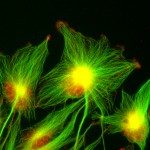Lien vers Pubmed [PMID] – 24062585
Philos. Trans. R. Soc. Lond., B, Biol. Sci. 2013;368(1629):20130015
Since its discovery in 1989 as a substrate of the Src oncogene, p120catenin has been revealed as an important player in cancer initiation and tumour dissemination. p120catenin regulates a wide range of cellular processes such as cell-cell adhesion, cell polarity and cell proliferation and plays a pivotal role in morphogenesis, inflammation and innate immunity. The pleiotropic effects of p120catenin rely on its interactions with numerous partners such as classical cadherins at the plasma membrane, Rho-GTPases and microtubules in the cytosol and transcriptional modulators in the nucleus. Alterations of p120catenin in cancer not only concern its expression level but also its intracellular localization and can lead to both pro-invasive and anti-invasive effects. This review focuses on the p120catenin-mediated pathways involved in cell migration and invasion and discusses the potential consequences of major cancer-related p120catenin alterations with respect to tumour spread.

